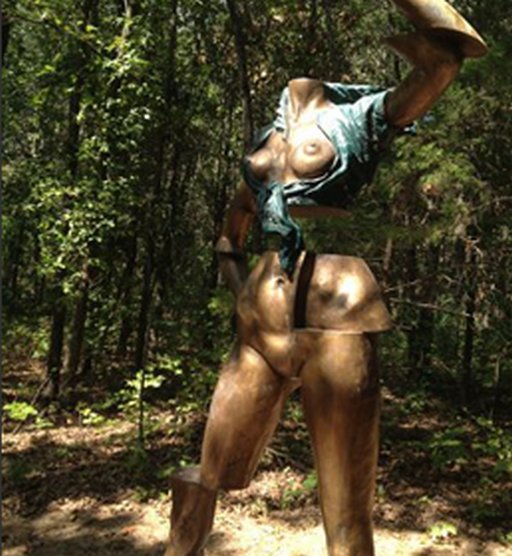Pornocalypse Comes…For The ACLU
Monday, October 21st, 2013 -- by Bacchus
Apparently this statue is at the center of a controversy in Kansas, where the raving loonies are having a second try at getting it declared legally obscene:

The American Civil Liberties Union is on the case (naturally enough) and recently they made a FaceBook post about it that included a photo of the statue. Facebook deleted it. And gave the freakin’ ACLU a 24-hour posting ban for having posted it:
We at the ACLU were reassured of one thing this past weekend: Facebook’s chest-recognition detectors are fully operational. A recent post of ours, highlighting my blog post about an attempt to censor controversial public art in Kansas, was itself deemed morally unfit for Facebook. The whole episode is a reminder that corporate censorship is bad policy and bad business.
The blog is about a kerfuffle over a statue in a public park outside Kansas City: a nude woman taking a selfie of her own exposed bronze breasts. A group of citizens organized by the American Family Association believes the statue to be criminally obscene (it isn’t), and has begun a petition process to haul the sculpture to court (really, they are). Our Facebook post included a link to the blog post and a photo of the statue in question.
Our intrepid Digital Media Associate, Rekha Arulanantham, got word on Sunday that the Facebook post had been deleted, and was no longer viewable by our Facebook followers or anyone else. I duly informed my Kansas colleague Holly Weatherford that the photograph she’d taken had prompted a social media blackout. Then, astoundingly, on Tuesday morning Rekha discovered the ACLU had been blocked from posting for 24 hours, with a message from Facebook warning us these were the consequences for repeat violations of its policy.
We were flabbergasted; we hadn’t tried to republish the offending post or the associated rack. So, just to get this straight: the ACLU’s post on censorship was shut down–not once, but twice–for including a picture of, and a political discussion about, a statue standing in a Kansas park.
Of course, the ACLU can get access to real humans at FaceBook in a way that normal people probably can’t:
There was no “appeal” button, and we were unable to find a page where we could report or challenge the post’s deletion. The best option appeared to be a generic Facebook content form, designed to receive any input at all about a “Page.” We got a response: a canned email informing us that Facebook “can’t respond to individual feedback emails.” Not exactly promising.
But we have an advantage most Facebook users don’t: We’re a national non-profit with media access and a public profile. So we tracked down Facebook’s public policy manager, and emailed him about our dilemma. His team was immediately responsive, looked into it promptly, and told us that the post was “mistakenly removed” (and then “accidentally removed again”). Here’s what Facebook wrote to us:
We apologize for this error. Unfortunately, with more than a billion users and the hundreds of thousands of reports we process each week, we occasionally make a mistake. We hope that we’ve rectified the mistake to your satisfaction.
Facebook then restored the original post.
…
our ultimate success is cold comfort for anyone who has a harder time getting their emails returned than does the ACLU. It’s unlikely that our experience is representative of the average aggrieved Facebook user. For most, that generic form and the canned response are as good as it’s currently going to get.
Indeed.
To be fair, this isn’t really a #pornocalypse story despite my post title. I’ve been using the pornocalypse buzzword and hashtag for stories about big internet companies who got big by being porn-friendly (or, at least, apathetic or agnostic about adult content on their platforms) who later inevitably decide to crack down on it and remove it in an attempt to be more attractive for investors, advertisers, and mainstream public opinion. Facebook, by contrast, has never been nudity-friendly as far as I know. This is really more of a cautionary tale about the doomed and foolish idea that you can machine-filter out nudity and sexual content without disrupting important grownup conversations (political, medical, et cetera) that you presumably actually do want on your social media platform. (I say “presumably” with some skepticism, though. In a world full of squeamish advertisers, perhaps FaceBook really would prefer that the ACLU doesn’t discuss a controversial nude statue. But if so, they have to know they can’t admit that out loud while still claiming to offer a functional social-media platform.)
Similar Sex Blogging:







